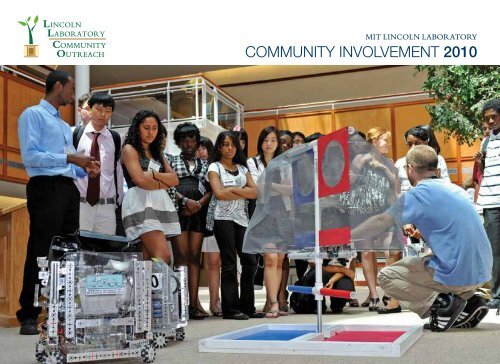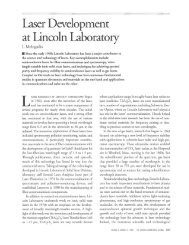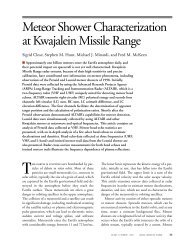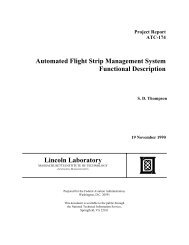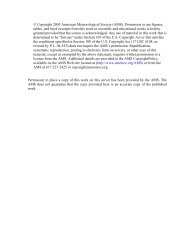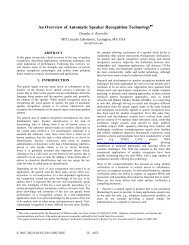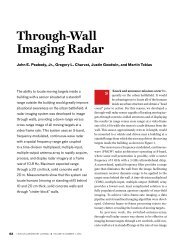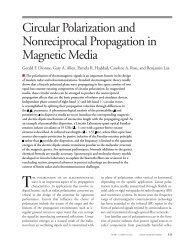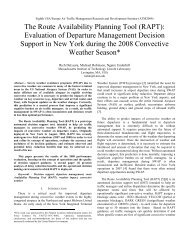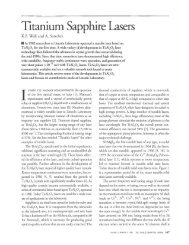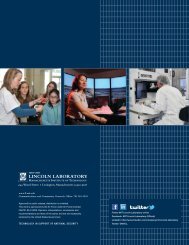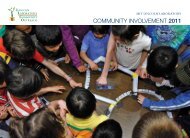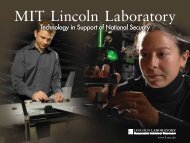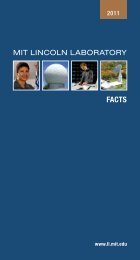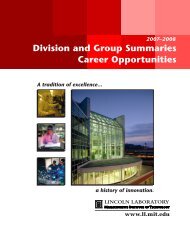Community involvement 2010 - MIT Lincoln Laboratory
Community involvement 2010 - MIT Lincoln Laboratory
Community involvement 2010 - MIT Lincoln Laboratory
You also want an ePaper? Increase the reach of your titles
YUMPU automatically turns print PDFs into web optimized ePapers that Google loves.
LINCOLN<br />
LABORATORY<br />
<strong>MIT</strong> lIncoln laboraTory<br />
COMMUNITY<br />
OUTREACH <strong>Community</strong> <strong>involvement</strong> <strong>2010</strong>
10<br />
<strong>Community</strong><br />
giving programs<br />
lincoln laboratory outreach by the numbers<br />
19<br />
K–12 Stem<br />
programs<br />
100+<br />
Scientists<br />
and engineers<br />
volunteering<br />
for outreach<br />
as mentors,<br />
speakers, or<br />
tour guides<br />
5,250<br />
Hours per year<br />
supporting<br />
Stem programs<br />
10,000+<br />
Students<br />
seeing Stem<br />
demonstrations<br />
at lincoln<br />
laboratory and<br />
in area schools
A message from the Director<br />
<strong>Community</strong> outreach and education programs are an important component of the laboratory’s mission.<br />
From the beginning, our outreach initiatives have been inspired by employee desires to help people in need<br />
and to motivate student interest and participation in engineering and science. there are many opportunities<br />
to participate. the laboratory’s educational outreach initiatives offer the opportunity to provide in-classroom<br />
and Science on Saturday presentations to regional K–12 schools, to sponsor u.S. FiRSt robotics programs,<br />
and to participate in mentor-based internships for college and graduate students preparing for science and<br />
technology careers. there are also opportunities to be a part of the laboratory’s volunteer base to serve<br />
as judges and advisors for local and regional science fairs and science-based activities. the laboratory is<br />
committed to giving back to the community by sponsoring fund-raising and community service events in<br />
support of the united Way, the national multiple Sclerosis Society, the Salvation Army, and other charitable<br />
organizations. the <strong>involvement</strong> of the entire lincoln laboratory community is encouraged and suggestions<br />
on how we might improve our outreach activities are welcomed.<br />
eric D. evans<br />
i<br />
eric evans, the Director of lincoln laboratory,<br />
meets students from Boston, Cambridge, and<br />
lawrence middle schools. these students<br />
visited the laboratory as part of the Science,<br />
technology, engineering, and math (Stem)<br />
Program offered by mit’s office of engineering<br />
outreach Program.
lincoln laboratory <strong>Community</strong> outreach (llCo)<br />
LLCO is an initiative to promote K–12 STEM<br />
educational outreach and community <strong>involvement</strong> and giving<br />
in partnership with <strong>MIT</strong>’s Office of Engineering Outreach<br />
Programs and the <strong>MIT</strong> Public Service Center.<br />
lincoln laboratory takes pride in promoting science and engineering education for all grade levels,<br />
and supporting the community through giving programs. outreach programs capitalize on the strengths of<br />
the lincoln laboratory scientific community and strive to integrate service with education and research.<br />
lincoln laboratory has a history of supporting educational outreach through three primary programs:<br />
massachusetts institute of technology’s (mit) vi-A master of engineering program, Worcester Polytechnic<br />
institute’s (WPi) major Qualifying Project, and the university cooperatives and summer intern program.<br />
However, since 2006, the laboratory has increased its focus on educational outreach initiatives, spawning<br />
the lincoln laboratory <strong>Community</strong> outreach committee, and cultivating the laboratory’s position to motivate<br />
interest and participation in science, technology, engineering, and math programs for K−12 students, develop<br />
a program to introduce minorities to engineering careers, and offer classroom presentations and science<br />
seminars targeted to specific ages.<br />
mit lincoln laboratory recently became a member of the national Defense education Program (nDeP).<br />
nDeP invests in science, engineering, and math education in K–12 programs and is supported by the<br />
Department of Defense Research & engineering. nDeP’s mission is to support a new generation of<br />
scientists and engineers who will apply their talents in the nation’s defense laboratories.<br />
ii
e D u C At i o n A l O U T R E A C H<br />
K–12 Science, technology, engineering, and math (Stem) outreach<br />
Partnerships with mit<br />
local Schools and teachers<br />
<strong>Community</strong> engagement<br />
e D u C At i o n A l C O L L A B O R AT I O N S<br />
technical Staff Programs<br />
Student Programs<br />
minority Programs<br />
C o m m u n i t y G I V I N G<br />
iii<br />
tA B l e o F C O N T E N T S
EdUCATIONAL Outreach
K–12 Stem outreach<br />
Science Seminar Series<br />
Dr. todd Rider coordinates a program that sends technical staff members to local schools, giving presentations to students in<br />
grades K–12. more than 7000 students have enjoyed presentations on cryogenics, electronic circuits, paleontology, biotechnology,<br />
astrophysics, and other topics. Since the program’s inception in 2005, technical staff members have delivered presentations and<br />
demonstrations to more than 6000 middle-school and high-school students.<br />
Science on Saturday<br />
this program features on-site science demonstrations by lincoln laboratory technical staff. more than 3500 local K–12 students,<br />
their parents, and teachers attend Science on Saturday events over the course of the school year. Attendees have enjoyed hands-on<br />
demonstrations on rockets, robotics, asteroids, archaeology, optics and lasers, and polymers. Presentations for the current year are:<br />
Feb. 6 Computer voice Recognition/Speech<br />
Apr. 3 optics and lasers<br />
Jun. 5 Digital electronics and Computers<br />
oct. 16 Amusement Park Physics<br />
Dec. 4 How Computers Communicate with each other<br />
1<br />
e D u C At i o n A l O U T R E A C H
K–12 Stem outreach<br />
The Robotics Outreach is designed to help<br />
students experience how interesting and rewarding<br />
the life of engineers and researchers can be.<br />
Robotics Outreach<br />
in addition to hosting hands-on workshops to introduce<br />
students to robotics programming, Robotics outreach at lincoln<br />
laboratory (Roll) sponsors several teams, in age groups ranging<br />
from 9- to 18-year-olds, at the For inspiration and Recognition of<br />
Science and technology (FiRSt) Robotics regional and national<br />
competitions. volunteers mentor students at weekly sessions that<br />
cover programming robots to complete challenges specified<br />
by FiRSt.<br />
High School Robotics<br />
FiRSt competitors of high-school age join FiRSt technical<br />
Challenge (FtC) teams, while students in middle school and below<br />
join FiRSt lego league (Fll) teams. twenty lincoln laboratory staff<br />
members volunteer as coaches and mentors for these teams.<br />
2
FTC Team 1<br />
team 2875 was active within the FiRSt community and shared the knowledge they gained<br />
with other teams. they have presented demonstrations at lincoln laboratory’s Sons and<br />
Daughters Days, mentored the new in-house team, and assisted in mentoring the external<br />
team. An initial sign of their hard work was their being named the “most Helpful team” at<br />
their first scrimmage.<br />
FTC Team 2<br />
the eight students in team 3590 quickly learned<br />
to work as a team, and their skills building with the<br />
Hitechnic FtC kit and programming with RoBotC<br />
showed consistent improvement.<br />
External FTC team<br />
lincoln laboratory also sponsored a team external<br />
to the laboratory—a high school in nearby Arlington.<br />
laboratory staff members, along with two science<br />
teachers from the school, mentored this team.<br />
together, they ensured that this rookie team of<br />
eight students had adequate supplies, funds, and<br />
guidance to design, build, and program their robot<br />
for competition.<br />
3<br />
e D u C At i o n A l O U T R E A C H
K–12 Stem outreach<br />
Robotics Teams —<br />
Grades 4 through 8<br />
FLL Team 1<br />
team 4851, llAmAs (short for lincoln laboratory<br />
Armageddon machine Activists), was made up of eight<br />
middle-school students who built on their experience to<br />
beat their ranking last year of 2nd place in state competition.<br />
the llAmAs won the Champion’s Award—the most<br />
prestigious award for not only technical performance, but<br />
also teamwork, respect, and gracious professionalism.<br />
FLL Team 2<br />
team 1618, Robothunder, was made up of six 5th- and<br />
6th-grade girls and boys. two girls are returning Fll<br />
participants from last year; and four boys were new to Fll.<br />
this team practiced making a program with a high level<br />
of repeatability.<br />
4
FLL Team 3<br />
team 4855, RoboBeavers, had eight 11-year-old boys. this team<br />
was honored with the leonardo da vinci Award, a prestigious design<br />
award for out-of-box thinking, and exceptionally creative robot design.<br />
they employed features such as four-wheel-drive trains and monstertruck-like<br />
jumping capabilities.<br />
FLL Team 4<br />
team 4854, tropical transporters, was a rookie team of 9-year-olds—<br />
three girls and four boys. new to robotic programming, this team was<br />
surprised how quickly they learned to control a robot.<br />
FLL Team 5<br />
team 6125, the newtons, had six 9-year-olds. this young group was<br />
excited about trying different approaches to accomplish a specific<br />
task and fine-tuning program commands.<br />
5<br />
e D u C At i o n A l O U T R E A C H
Partnerships with mit<br />
in addition to hiring mit graduate students and undergraduates as research assistants, co-ops, and interns, and<br />
forging relationships with technical researchers and professors, lincoln laboratory and mit are also partnering in<br />
the field of educational outreach for K–12 students.<br />
mit’s Department of engineering’s office of engineering outreach Programs (oeoP) provides deserving students<br />
rigorous academic experiences that will give them a better sense of how technical concepts relate to their everyday<br />
lives and encourage them to pursue careers in science and engineering. Students are provided engaging, hands-on<br />
curriculum that strengthens their foundational math, science, and communication skills in a challenging learning<br />
environment with high expectations, paired with access to top positive role models. this year, lincoln laboratory<br />
became affiliated with four mit educational outreach programs: miteS, SeeD, mSBP, and Stem.<br />
Minority Introduction to Engineering<br />
and Science (<strong>MIT</strong>ES) Program<br />
this six-week residential summer program for the top high-school<br />
students in the nation stresses the value and reward of pursuing<br />
advanced technical degrees and careers while developing the skills<br />
necessary to achieve success in science and engineering. lincoln<br />
laboratory’s <strong>involvement</strong> in this program consisted of<br />
• Sponsoring two students in the six-week summer program<br />
at mit<br />
• Hosting 75 students enrolled in the miteS program for<br />
presentations and tours<br />
6
Saturday Engineering and Enrichment<br />
discovery (SEEd) Academy<br />
the SeeD Academy is a seven-semester technical<br />
career-exploration program for promising but traditionally<br />
under-served high-school students in Boston, lawrence,<br />
and Cambridge. lincoln laboratory<br />
• Sponsored an aeronautics/astrophysics course<br />
• Provided presentations and tours of laboratory<br />
facilities<br />
<strong>MIT</strong> Science of Baseball Program (MSBP)<br />
this four-week summer program for 8th grade boys from<br />
Boston, lawrence, and Cambridge featured an integrated<br />
academic and athletic curriculum to channel the students’<br />
enthusiasm for baseball into a renewed excitement for and<br />
increased proficiency in the math, science, and culture behind<br />
the game. lincoln laboratory’s <strong>involvement</strong> in this program<br />
consisted of<br />
• Partial sponsorship of one local middle-school student<br />
• Presentations and tours of laboratory facilities<br />
• Challenging the students to a softball game<br />
7<br />
e D u C At i o n A l O U T R E A C H
Partnerships with mit<br />
Science, Technology, Engineering, and Mathematics (STEM) Program<br />
Stem is a year-round academic enrichment program including mentoring and a summer institute for middle-school<br />
students from Boston, Cambridge, and lawrence. the courses use lectures, projects, and experiments to help<br />
participants develop mathematical thinking and problem-solving abilities in preparation for high-school “gateway”<br />
math and science classes, in an attempt to increase the number of local students in the technical workforce.<br />
lincoln laboratory’s <strong>involvement</strong> in this program consisted of<br />
• Sponsoring a robotics course for 20+ students<br />
• Providing tours of laboratory facilities<br />
• Presenting a Science on Saturday demonstration at a school location<br />
Ceres Connection<br />
The Ceres Connection names<br />
minor planets in honor of students<br />
and their teachers.<br />
under the Ceres Connection program, minor planets discovered by lincoln laboratory’s near-earth Asteroid Research<br />
program are named in honor of science students in grades 5–12 and their teachers. the honorees are selected through<br />
science competitions directed by the Science education Department at the Society for Science & the Public. to date,<br />
approximately 2500 students and their teachers have been honored. each year, the Ceres Connection program awards<br />
about 250 students with this honor.<br />
8
local Schools and teachers<br />
Science on Saturday on Tour<br />
lincoln laboratory is taking the already successful<br />
Science on Saturday demonstration “How Computers<br />
Work” to mit to celebrate the 150th anniversary of<br />
mit in April 2011. this demonstration lets children<br />
show how computers communicate using 0s and<br />
1s (right). laboratory scientists will be presenting<br />
demonstrations at the tech expo for this event,<br />
as well.<br />
Sister Robotics Teams<br />
Roll forged a collaboration with Arlington High School by mentoring a rookie team for the FiRSt robotics competition.<br />
With the help of laboratory mentors, the Arlington team received guidance on how to design, build, and program their<br />
robot for competition. this rookie team even hosted a scrimmage for area teams, learning many new techniques from<br />
the visiting teams.<br />
9<br />
e D u C At i o n A l O U T R E A C H
local Schools and teachers<br />
Minuteman Career and Technical High School<br />
lincoln laboratory employs students from the minuteman vocational<br />
School in lexington, as part of its high-school internship program.<br />
the internships comprise twenty weeks over the academic school<br />
year and provide students with hands-on experience in a realworld<br />
laboratory setting. Senior michael Jagger (right) worked in<br />
the mechanical engineering Group and developed drawings and<br />
modeling of parts for a sensor lincoln laboratory is developing.<br />
Additionally, michael created CAD/CAm drawings for projects using<br />
CoCreate oneSpace 2007 and model manager.<br />
Senior Ben Caesar worked in the iSR and tactical Systems Division<br />
working on databases and maintaining web pages.<br />
10
John d. O’Bryant School Program<br />
Students from the John D. o’Bryant School of math and Science in<br />
Roxbury, visited the laboratory in october 2009 and march <strong>2010</strong>.<br />
technical staff members gave presentations on what inspired them<br />
to Stem majors and careers. the students received tours of the<br />
Flight and Antenna test Facility.<br />
Cross-teaching with Northeastern University<br />
lincoln laboratory is considering initiating a cross-teaching program<br />
in which laboratory staff could teach a university course, and faculty<br />
from northeastern university could host a course on premises at<br />
lincoln laboratory. Further potential exists for northeatern university<br />
faculty to collaborate on two laboratory programs, while the<br />
laboratory could offer support in one university program. A variety<br />
of educational programs to train students and career professionals<br />
in key technologies may be offered.<br />
11<br />
e D u C At i o n A l O U T R E A C H
local Schools and teachers<br />
Leadership Initiatives for Teaching<br />
and Technology<br />
the leadership initiatives for teaching and technology<br />
(liFt2 ) program provides middle- and high-school teachers<br />
with summer internships in a technical field in an effort to<br />
help teachers relate classroom curriculum to authentic and<br />
relevant applications in the 21st century workplace. each<br />
summer, two to four teachers participate in this program,<br />
gaining insight into new skill sets needed by today’s technical<br />
workforce, and better helping their students prepare for<br />
future careers. in <strong>2010</strong>, the laboratory hosted Kyle Wescott<br />
(far right, shown with mentors Jessica olszta and Wes<br />
olson), a math teacher from marlborough High School, in<br />
the Weather Sensing Group to analyze data related to the<br />
traffic Alert and Collision Avoidance System for avoiding<br />
mid-air collisions. Alan Chuckran, a Dracut High School<br />
physics teacher, worked in the Surveillance Systems Group<br />
evaluating field data to better understand the impact of<br />
weather on airport operations. A third internship in both the<br />
net-centric operations Group and the Airborne networks<br />
Group analyzing wireless network performance was offered<br />
to Carla Pavao who teaches math at Hudson High School.<br />
12
<strong>Community</strong> engagement<br />
Massachusetts State Science and Engineering Fair<br />
lincoln laboratory technical staff have been volunteering as judges for the<br />
massachusetts State Science and engineering Fair since 2000, evaluating six to eight<br />
projects by high-school students. At the <strong>2010</strong> massachusetts State Science and<br />
engineering Fair, lincoln laboratory became a bronze donor of the event by sponsoring<br />
winners in the Physics and engineering competitions. Additionally, nine laboratory<br />
scientists (Shourov Chatterji, Jessica Deniger, Phillip evans, Caroline lamb, todd Rider,<br />
neal Spellmeyer, Zack Weber, Alexandra Wright, and Jung yoon) participated in the<br />
science fair as judges. lincoln laboratory has also volunteered judges for inventeams<br />
competitions in which high-school teams from around the country send research<br />
proposals to mit for judging and potential funding.<br />
Lexington High School Science and Engineering Fair<br />
in <strong>2010</strong>, six technical staff (eric Austin, Anthony Filip, Robert legge, Brian Shucker,<br />
Joseph Stewart, and Grant Stokes) from lincoln laboratory supported lexington High<br />
School by volunteering as judges for the school’s Science and engineering Fair.<br />
13<br />
e D u C At i o n A l O U T R E A C H
<strong>Community</strong> engagement<br />
Cambridge Science Festival<br />
in coordination with mit, lincoln labora-<br />
tory <strong>Community</strong> outreach partnered with<br />
Robotics outreach volunteers to man a<br />
booth in the Cambridge Science Festival,<br />
a multifaceted, multicultural event, providing<br />
robotics demonstrations and hands-on<br />
activities to an estimated 15,000 people from<br />
the new england region. the Cambridge<br />
Science Festival, the first of its kind in the<br />
united States, is a week-long celebration<br />
showcasing Cambridge as an internationally<br />
recognized leader in science, technology,<br />
engineering, and math.<br />
The Cambridge Science Festival<br />
makes science accessible, interactive,<br />
and fun.<br />
14
Boy Scout Inventing Merit Badge Program<br />
lincoln laboratory technical staff members Curtis Heisey and Jonathan Williams took part in the Boy Scouts of America<br />
inventing merit Badge Workshop sponsored by the lemelson-mit Program, School of engineering, at mit. Curtis and Jonathan<br />
briefed the Boy Scouts on unpatented inventions and open-source technology<br />
Additionally as part of the program, Curtis and maria Picardi Kuffner hosted an Aviation merit Badge workshop for 22 local<br />
Boy Scouts at Hanscom Air Force Base’s Aero Club. the workshop gave scouts the opportunity to learn about aviation as a<br />
career and earn the Aviation merit Badge. this hands-on workshop taught scouts about aircraft and flight, inspection of a plane,<br />
aeronautics, map reading and control surfaces on a model aircraft, forces on a plane, demonstrations of a wing section in a<br />
wind tunnel, and careers in aviation.<br />
Tours<br />
As part of the lincoln laboratory <strong>Community</strong> outreach Program, tours of laboratory facilities such as the microelectronics laboratory,<br />
Air traffic Control laboratory, and Flight and Antenna test Facility were given to a number of groups such as the following:<br />
new Jersey institute of technology Cadets<br />
DARPA Program managers<br />
Air Force Cadets<br />
uSAFmC<br />
mit minority engineering interphase Group<br />
Army test and evaluation Command<br />
u.S. Army natick laboratory<br />
West Point Cadets<br />
national Reconnaissance office Fellows<br />
leader-to-leader Group<br />
Armed Forces Communications and electronics Association<br />
eSC Hanscom Air Force Base personnel<br />
15<br />
e D u C At i o n A l O U T R E A C H
EdUCATIONAL cOllabOratiOns<br />
16
technical Staff Programs<br />
17<br />
Technical Staff Seminars<br />
the technical staff stay current in their field by presenting<br />
technical seminars at area universities and hosting<br />
technical seminars at lincoln laboratory. Seminar series<br />
are built to motivate and inspire while facilitating working<br />
relationships. lincoln laboratory conducts seminar<br />
series with researchers at mit, northeastern university,<br />
and Pennsylvania State university College of information<br />
Sciences and technology. lincoln laboratory also has<br />
an in-house education program which offers courses<br />
in technical subjects such as electro-optics, classes in<br />
software applications, one-day technical seminars, and<br />
workshops in leadership and business skills. last year,<br />
the laboratory hosted 17 seminars under this educational<br />
outreach program.<br />
e D u C At i o n A l C O L L A B O R AT I O N S
technical Staff Programs<br />
Integrated Photonics Initiative<br />
the integrated Photonics initiative is a multiyear, lincoln laboratory–<br />
funded collaboration between the laboratory and the mit Campus<br />
to support the research of doctoral candidates working on integrated<br />
photonic materials, devices, and subsystems. its objectives are to<br />
identify Department of Defense mission areas that could benefit from<br />
integrated photonic technologies, develop these technologies through<br />
graduate research, and work to insert the technologies into advanced<br />
communication and sensor systems. Current research topics include<br />
the development of high-power slab-coupled optical amplifiers,<br />
integrated ultrafast optical logic gates, and absorbance modulated<br />
optical lithography.<br />
18
Computer Science and Artificial<br />
Intelligence <strong>Laboratory</strong><br />
lincoln laboratory collaborates with the mit Computer<br />
Science and Artificial intelligence laboratory (CSAil).<br />
in 2009, a robotic forklift was developed for military logistics<br />
applications. the project aimed to reduce the number of<br />
human operators exposed to harm in war-zone storage<br />
facilities. there are ongoing collaborations with CSAil<br />
in such areas as cognitive speech systems and highperformance<br />
embedded computing. the laboratory’s<br />
technology office Special Seminars often feature guest<br />
speakers from CSAil to discuss robotic networks and<br />
artificial intelligence.<br />
19<br />
e D u C At i o n A l C O L L A B O R AT I O N S
Student Programs<br />
Graduate Fellowship Program<br />
lincoln laboratory offers a limited number of graduate<br />
fellowships to science and engineering students<br />
pursuing mS or PhD degrees at partner universities.<br />
the fellowship program awards funds to support a<br />
Fellow’s stipend, supplement a graduate assistantship,<br />
or subsidize other direct research expenses during<br />
a student’s thesis research. in 2009, this program<br />
has awarded funds to four mit students and seven<br />
students at other partner universities.<br />
<strong>Lincoln</strong> Scholars Program<br />
technical staff are eligible to apply for entry into the<br />
lincoln Scholars Program for both master’s and<br />
doctoral levels which enables the pursuit of advanced<br />
degrees on a full-time basis. last year, 12 staff entered<br />
the lincoln Scholars Program and attended mit,<br />
gaining valuable knowledge applicable to their work<br />
and higher education.<br />
20
<strong>MIT</strong> VI-A Master of Engineering Thesis Program<br />
lincoln laboratory is an industry partner of mit’s Department of electrical engineering<br />
and Computer Science vi-A master of engineering thesis Program. the vi-A students<br />
selected to work at lincoln laboratory spend two summers as paid interns, participating<br />
in projects related to their fields. the students work with an industry mentor while acquiring<br />
experience in testing, design, development, research, programming, and project planning,<br />
and are then supported as research assistants while they complete their thesis research at<br />
lincoln laboratory.<br />
distance Learning Programs<br />
For talented and motivated staff members interested in pursuing a master’s degree,<br />
the laboratory offers the opportunity to participate in distance learning programs offered<br />
by Carnegie mellon university and by the Pennsylvania State university College of<br />
information Sciences and technology while continuing to work full time at the laboratory.<br />
WPI Major Qualifying Program<br />
lincoln laboratory collaborates with Worcester Polytechnic institute (WPi) in its<br />
major Qualifying Project (mQP) program, which requires students to complete an<br />
undergraduate project equivalent to a senior thesis. the mQP demonstrates the<br />
application of skills, methods, and knowledge to the solution of a problem representative<br />
of the type encountered in industry. lincoln laboratory usually accepts 15–20 students<br />
in the mQP per year.<br />
21<br />
e D u C At i o n A l C O L L A B O R AT I O N S
Student Programs<br />
Summer Research Program<br />
lincoln laboratory offers undergraduate and graduate<br />
students the unique opportunity to gain hands-on<br />
experience in a leading-edge research environment.<br />
Program participants contribute to projects and gain<br />
experience that complements their courses of study.<br />
the laboratory hires approximately 100 students from<br />
top universities every summer to participate in Summer<br />
Research Program internships.<br />
University Cooperative Education Studies<br />
technical groups at lincoln laboratory employ students from mit, northeastern university, and other area colleges as co-ops working<br />
full time with mentors during the summer and part time during the academic term. Co-ops participate in building prototypes, help<br />
solve problems, assist in research activities, and test applications in the field. Highly qualified students selected as co-ops can become<br />
significant contributors to project teams. Currently, sixteen students are working as research assistants on lincoln laboratory programs.<br />
<strong>MIT</strong> Undergraduate Research Opportunities Program<br />
under the mit undergraduate Research opportunities Program (uRoP), lincoln laboratory invites undergraduates to participate in<br />
on-site research projects. mit undergraduates may be involved in every phase of research, developing research plans, writing proposals,<br />
performing experiments and measurements, analyzing data, and presenting research results. the laboratory usually hosts five<br />
uRoP students in the summer and three in the winter.<br />
22
Naval War College and Maxwell Air University<br />
The synergy between the campus focus<br />
on basic research and the <strong>Laboratory</strong> knowledge of defense<br />
applications has benefited both communities.<br />
lincoln laboratory recently completed teaching an elective at the naval War College in newport, Rhode island, entitled, net-Centric<br />
and Cyber operations: implications for national Security. this course, co-taught by lincoln laboratory staff and the Fletcher School at<br />
tufts university, prepares the students, all o-4 and o-5 level officers, for the technology and policy challenges they will face as the DoD<br />
enhances information superiority through increased data sharing and collaboration and ensures its ability to operate in cyberspace by<br />
securing and defending critical information. this course was first offered in 2008 with a sole focus on net-centric operations policy and<br />
implementation challenges. in 2009, the course was enhanced to include cyber operations and an overview of cyber threats. Students<br />
have described the net-Centric and Cyber operations course as “one of the best at the naval War College.” Based on the popularity of<br />
this course, lincoln laboratory now offers a similar, but abbreviated, elective at the Air Force Center for Professional military education<br />
(also known as Air university) at maxwell-Gunter Air Force Base in Alabama.<br />
Another elective at the naval War College co-taught by lincoln laboratory staff and tufts university is Homeland Security and<br />
Counterterrorism: technological and Policy Foundations. this course explores in a systematic fashion the critical technologies,<br />
capabilities, operational concepts, and policies that will influence how the united States defends its homeland and deals with the<br />
threats posed by terrorism. Students examine the fundamental systems and capabilities that are part of homeland security and<br />
counterterrorism, and learn to assess the ability of the united States to integrate and employ these systems and technologies to<br />
achieve the desired strategic effects of military power. tufts university and lincoln laboratory teach similar courses in Space<br />
technology and Policy, and Ballistic missile Defense.<br />
23<br />
e D u C At i o n A l C O L L A B O R AT I O N S
minority Programs<br />
Undergraduate diversity Awards<br />
the undergraduate Diversity Awards expand opportunities for women and minorities pursuing bachelor’s degrees in<br />
engineering and science at selected colleges and universities. the award is typically in the form of tuition assistance,<br />
support for technical paper presentations, or funds for independent research projects. Awards are provided each year<br />
at colleges and universities where lincoln laboratory has little or no presence, such as Bryn mawr College, Howard<br />
university, mount Holyoke College, new mexico State university, north Carolina Agricultural and technical university,<br />
Smith College, Spelman College, Stevens institute of technology, the university of Puerto Rico, and Wellesley College.<br />
AFCEA International Program<br />
lincoln laboratory participates in the Armed Forces Communications<br />
and electronics Association (AFCeA) international Program. AFCeA<br />
arranges summer internship opportunities for graduating high-school<br />
seniors interested in Stem careers. While three to four students are<br />
offered laboratory internships each summer, at least 40 students<br />
tour the laboratory facilities, seeing the latest research performed<br />
at the laboratory and learning about various career options in math<br />
and science. in <strong>2010</strong>, the laboratory’s Advanced Sensor techniques<br />
Group, the Chemical, Biological, and nanoscale technologies Group,<br />
and the Advanced electro-optical Systems Group each were assisted<br />
by an AFCeA intern. At right, AFCeA intern Katie Coe analyzed proteins<br />
using electrophoresis to separate the protein molecules according to<br />
size as part of her work producing and extracting proteins.<br />
24
25<br />
Introducing High School Girls<br />
to Engineering<br />
this one-day event allows high-school girls to visit<br />
the science departments of mit, observe cutting-edge<br />
research, see demonstrations in laboratories, and<br />
interact with female engineers. lincoln laboratory<br />
hosts a tour of the facility and, by enabling area<br />
participants to attend the event free of charge, exposes<br />
more girls to careers in engineering. typically, about<br />
20 girls attend the facility tour of working laboratories<br />
such as the laboratory’s Air traffic management lab,<br />
microelectronics lab, and biology labs, discovering the<br />
different ways science and math are used in lincoln<br />
laboratory careers. laboratory staff consider this an<br />
opportune time to give a highly personalized tour, and<br />
allow in-depth question and answer sessions with<br />
female engineers.<br />
e D u C At i o n A l C O L L A B O R AT I O N S
COMMUNITy GivinG<br />
26
<strong>Community</strong> Giving<br />
lincoln laboratory employees are actively engaged in many activities supporting<br />
worthy causes contributing to the overall quality of life within and outside of our<br />
community in partnership with the mit Public Service Center. llCo strives to raise<br />
awareness of local needs by organizing fundraising and outreach events that support<br />
selected charity organizations. A diverse range of opportunities are provided for<br />
employees to volunteer their time and resources.<br />
Support the Troops Program<br />
lincoln laboratory runs an ongoing campaign of support for deployed u.S. troops.<br />
Donations of food, books, games, and toiletries are collected daily, boxed by volunteers,<br />
and mailed weekly to military personnel serving in iraq and Afghanistan. there are<br />
typically about 60 soldiers on the mailing list. in the past year, a total of 215 care packages<br />
were mailed to 37 different troops.<br />
27<br />
C o m m u n i t y G I V I N G
<strong>Community</strong> Giving<br />
Thanks to the tremendous efforts<br />
of participants and donors, hope for finding a cure<br />
for MS is stronger than ever.<br />
MS Bike & Hike<br />
lincoln laboratory forms teams to participate in the annual “Bike and Hike<br />
the Berkshires” event to raise funds for the multiple Sclerosis Society. the<br />
<strong>2010</strong> hiking and cycling teams totaled 27 members and raised more than<br />
$14,500 for the multiple Sclerosis Society.<br />
United Way Campaign<br />
lincoln laboratory sponsors an annual drive in coordination with mit<br />
to donate to the united Way through paycheck donation or a direct<br />
one-time contribution. the united Way helps human service agencies<br />
respond to urgent needs in the community and builds a brighter future<br />
for those in need.<br />
28
Alzheimer’s Walk<br />
in 2009, lincoln laboratory began participating in the Alzheimer’s<br />
Association memory Walk— the nation’s largest event to raise<br />
awareness and funds to fight Alzheimer’s disease. in <strong>2010</strong>, this<br />
relatively new giving program was supported by 16 laboratory<br />
employees and raised more than $11,900 to support research<br />
to treat and prevent Alzheimer’s disease.<br />
Holiday drives<br />
the mit Credit union in lincoln laboratory serves as a drop-off point for toys for tots<br />
holiday toy drive, providing toys for kids in needy families. each year, numerous toys<br />
are generously donated for holiday delivery.<br />
Giving Tree<br />
lincoln laboratory also conducts a “giving tree” during the holidays to respond to<br />
specific wishes from local families in need. this program is paired with a food drive,<br />
so that each recipient receives a requested gift and a food item for the holidays. Paula<br />
mason, coordinator of the giving tree program, advocated for laboratory participation<br />
in this program which collected gifts for 350 recipients last year.<br />
29<br />
C o m m u n i t y G I V I N G
<strong>Community</strong> Giving<br />
Food drive<br />
lincoln laboratory <strong>Community</strong> outreach promotes food donation<br />
drives to support the Food for Free organization, which responds<br />
to both waste and local hunger by rescuing fresh food that might<br />
otherwise go to waste and distributing it within the emergency<br />
food system where it can reach those in need, providing healthy<br />
food to more than 60 local emergency food programs, and over<br />
20,000 individuals.<br />
Used Book drive<br />
in coordination with the mit <strong>Community</strong> Giving Fund, lincoln<br />
laboratory holds an annual used book drive each February.<br />
Proceeds support the mit <strong>Community</strong> Service Fund, which<br />
offers grants to charities in Boston and Cambridge. the most<br />
recent book drives raised between $1150 and $2850 in support<br />
of community services.<br />
30
Clothing drives<br />
Several local shelters—Shelter, inc. (an emergency and family shelter), on the Rise (a shelter for domestic violence survivors and<br />
homeless women), the Salvation Army, and CASPAR (an alcohol and substance abuse program for homeless men and women)—<br />
receive donations of gently used clothing from the laboratory community during annual clothing drives.<br />
lincoln laboratory also participates each winter in the coats for Kids drive. lincoln laboratory collects warm coats for all ages and<br />
delivers them to Anton’s Cleaners. All coats are cleaned free of charge and given to those in need through an extensive distribution<br />
partnership. the Coats for Kids program, now in its 15th year, aims to provide 60,000 coats in the greater Boston area each winter.<br />
lincoln laboratory donated more than 500 coats in last year’s coat drive.<br />
A program new to llCo is hannah’s socks, a national program<br />
collecting new socks for the homeless, begun by a 4-year-old girl who<br />
gave a homeless man her socks because he had none. this national<br />
program seeks to collect the least given, but most needed articles of<br />
clothing for shelters around the country. lincoln laboratory donated<br />
1930 items to support the Pine Street inn, which serves 1300 people<br />
daily from their soup kitchen and several thousand more through their<br />
housing programs.<br />
in coordination with a marine chaplain stationed in iraq, lincoln<br />
laboratory <strong>Community</strong> outreach hosted a coat drive specifically<br />
for iraqi children, sending 32 care packages to one village in iraq.<br />
Warm clothing has also been donated to orphans and refugees in<br />
Afghanistan who lack adequate clothing for cold evenings.<br />
31<br />
C o m m u n i t y G I V I N G
<strong>Community</strong> Giving<br />
32<br />
Habitat for Humanity<br />
lincoln laboratory’s new employees network initiated<br />
a new outreach activity and invited all employees to<br />
join in helping Habitat for Humanity build an affordable<br />
house in the local area for a needy family. the laboratory<br />
is happy to aid Habitat for Humanity in its mission to<br />
eliminate poverty housing and provide safe, healthy living<br />
conditions while strengthening community ties. in July<br />
<strong>2010</strong>, volunteers from lincoln laboratory joined together<br />
to seal a foundation, add gravel under a deck, and install<br />
a basement drain system.<br />
5K Fun Run<br />
lincoln laboratory holds an annual fun run in collaboration<br />
with the onsite mit Fitness Center. Participants run on a<br />
prescribed path in the laboratory/Hanscom neighborhood.<br />
this fun run supports a different charity each year while<br />
promoting fitness and community service. in <strong>2010</strong>, runners<br />
participated in this fun run over their lunch time, raising<br />
funds from the laboratory community for the veterans<br />
Hospital in Bedford, massachusetts.
Marshallese handcrafts are an<br />
important part of the economy of<br />
the Marshall Islands.<br />
Marshallese Island Outreach<br />
lincoln laboratory operates a field site at the u.S. Army Kwajalein<br />
Atoll installation located about 2500 miles WSW of Hawaii. twenty<br />
staff members, accompanied by their families, work at this site,<br />
serving two- to three-year tours of duty.<br />
their families become part of the community. the amiable relationship<br />
enjoyed by the laboratory staff and the local community prompted<br />
the initiation of the marshallese outreach program, developed to<br />
enrich educational and life experiences of the marshallese people.<br />
each summer, two marshallese college students are supported as<br />
interns at a laboratory facility. each fall, a scholarship is awarded<br />
to a local student choosing a career path in science, technology,<br />
engineering, or math. laboratory staff at Kwajalein contribute to the<br />
student lunch program for the local elementary school, and assist<br />
artisan residents by displaying and selling marshallese handcrafts.<br />
33<br />
C o m m u n i t y G I V I N G
LINCOLN LABORATORY<br />
MASSACHUSETTS INSTITUTE OF TECHNOLOGY<br />
244 Wood Street, Lexington, MA 02420-9108<br />
LINCOLN<br />
LABORATORY<br />
COMMUNITY<br />
OUTREACH<br />
Communications and <strong>Community</strong> Outreach Office<br />
781-981-4204 ■ www.ll.mit.edu ■ ccoo@ll.mit.edu


